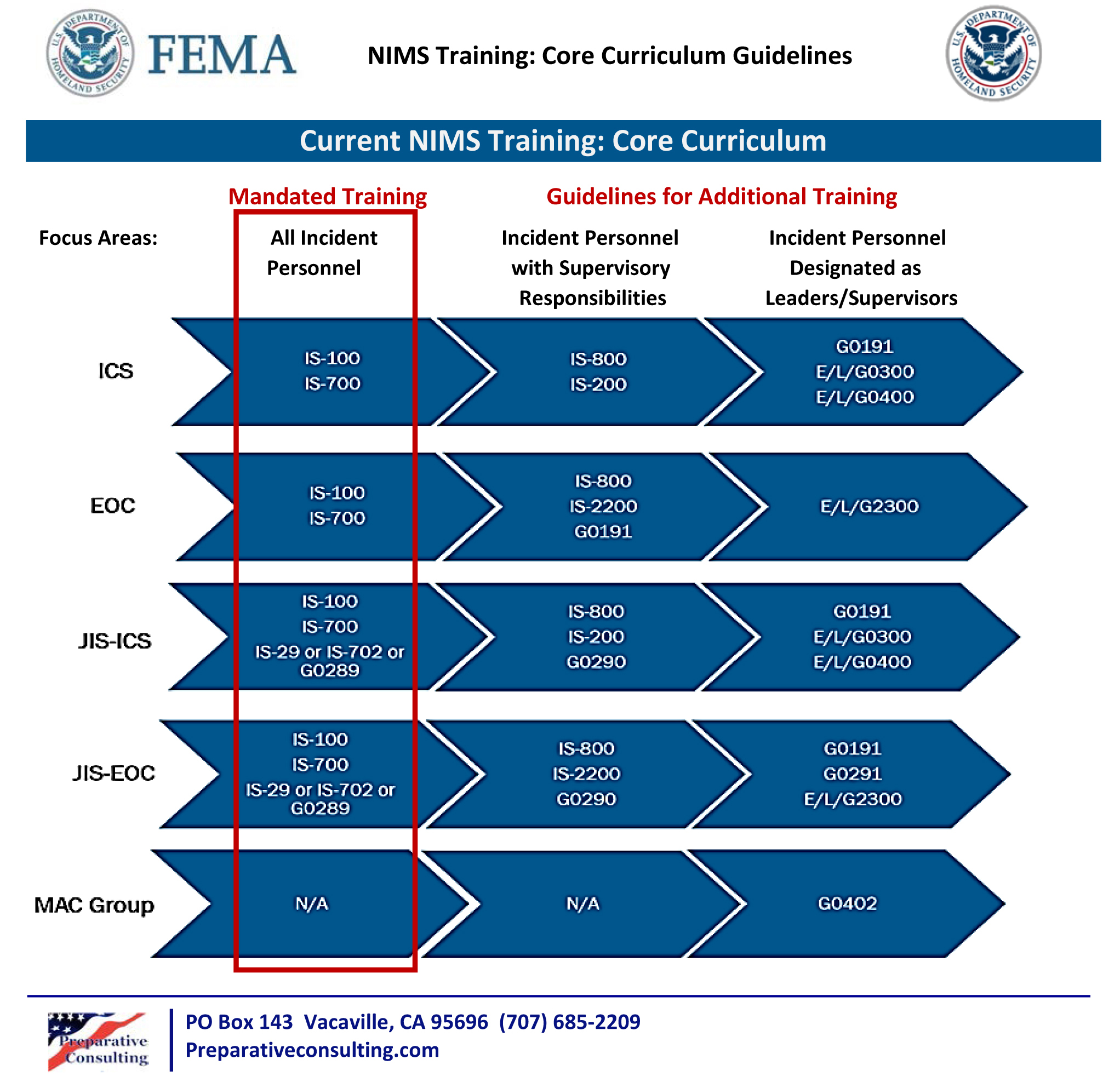
Training
FEDERAL AND STATE TRAINING






Federal and State Training Mandates
“The National Preparedness System (NPS) provides a way to organize preparedness activities and programs pursuant to the National Preparedness Guidelines (NPG). The desired end-state of our National Preparedness System is to achieve and sustain coordinated capabilities to prevent, protect against, respond to, and recover from all hazards in a way that balances risk with resources” (US Department of Homeland Security, NPG). The Federal Government and the State of California have mandated local governmental agencies, including special districts, to prepare and train to meet these challenges. Homeland Security Presidential Directive (HSPD-5) requires adoption of National Incident Management System (NIMS) by States, Tribal, and local organizations as a condition for Federal preparedness awards. The California Emergency Services Act (ESA) and California Government Code Section 8607 (a) requires the training in and use of the Standardized Emergency Management System (SEMS) in order to be eligible for state funding of response-related personnel costs. Preparative Consulting offers a comprehensive approach to ensuring emergency preparedness and compliance with State and Federal training and exercise mandates. Following the FEMA “Preparedness Cycle”, we will pursue a systematic process to ensure compliance and your desired level of emergency preparedness.
Our Training Staff and Certification
Our Instructional Staff are certified outreach or adjunct instructors for the California Governor’s Office of Emergency Services (CalOES)/ California Specialized Training Institute (CSTI) with extensive real world experience in Public Safety and Emergency Management. Many of our instructional staff are also certified Federal Emergency Management Agency (FEMA) trainers. All of our training courses are certified by Cal OES/CSTI, meet the requirements of HSPD-5 and California Gov. Code 8700(a), and are consistent with the program goals for the Emergency Management Performance Grant (EMPG) Program and all three Homeland Security Grant Programs (HSGP). All successful course participants will receive a Certificate of Achievement from CalOES/CSTI and will be entered into the California State training data base for future auditing or training verification. Our ICS 300 – Intermediate ICS for Expanding Incidents and ICS 400 – Advanced ICS: Command and General Staff – Complex Incidents Courses are also certified by the Cal Fire – Office of the State Fire Marshall for promotional credit.
Certified Training Curriculum
SEMS/ NIMS Combined Course – (SEMS, ICS 100, ICS 200, IS 700, IS 800)
Upon completion of these two 8-hour courses, students will understand the Incident Command System structure, features, and principles. Students will learn the role and application of Multi-Agency Coordination and Mutual Aid. Students will understand how to apply California’s Standardized Emergency Management System (SEMS) and the National Incident Management System (NIMS) to all hazard response and recovery. Completion of this course will satisfy the SEMS and NIMS training mandates under California Gov. code 8700 and Homeland Security Presidential Directive 5 (HSPD-5). These two separate one-day courses combines the following courses: Day One All Staff
- Standardized Emergency Management System (SEMS) Introduction
- Introduction to Incident Command System (ICS 100)
- National Incident Management System (NIMS), An Introduction (IS 700)
Day Two Supervisors
- ICS for Single Resources and Initial Action Incidents (ICS 200)
- National Response Framework, An Introduction (IS 800)
Emergency Operations Center (EOC) Management and Operations – (G775)
This two-day (16 hour) course focuses on the Management and Operation of an EOC. Content includes Multiagency Coordination, EOC design and staffing, NIMS requirements for interoperable and redundant communications, situational awareness and establishing a common operating picture, the process to activate and deactivate an EOC, Field to EOC interface, and EOC training and exercises.
EOC and Field Interface Workshop – (G191)
This one-day (8 hour) course is generally delivered in conjunction with the G775 course. Building on the curriculum learned in the G775 course, students apply this knowledge during the G191 course workshop.
EOC Action Planning Workshop
Upon completion of this one-day (8 hour) course, students will learn the planning process and be able to establish and document EOC direction, objectives, and priorities for the operational period.
EOC Position Specific Credentialing (LSEMS-Management, Operations, Planning, Logistics, Finance)
Once EOC staff have received the mandated foundational NIMS/SEMS course training, more specific training is required to provide EOC staff with the specific training and knowledge necessary for them to carry out the roles and responsibilities for the position to which they are assigned. This EOC All Section Positions Specific Training course focuses on key EOC positions within the Management, Operations, Planning & Intelligence, Logistics, and Finance & Administration Sections based on the California Governor’s Office of Emergency Services (Cal OES) EOC Section/Position credentialing document. This course may be delivered in five consecutive days (40 hour) or each section may be delivered separately in one-day (8 hours) each. Each course delivery will include the following content:
- Section and position roles and responsibilities
- Functions of the various sections/positions within the EOC
- Interaction between the various sections/positions
- Detailed position descriptions
- Table-Top Exercise to apply section/position concepts
ICS 300 – Intermediate ICS for Expanding Incidents*
Upon completion of this three-day (20 hour) course, students will be able to describe how the NIMS command and management component supports the management of expanding incidents and how the incident or event management process for supervisors and expanding incidents is prescribed by ICS. Students will be able to implement the incident management process in a simulated Type 3 incident and develop an incident action plan.
ICS 400 – Advanced ICS: Command and General Staff – Complex Incidents*
This two-day (16 hour) course provides training and resources for personnel who require advanced application of the ICS and will explain how major incidents engender special management challenges, describe the circumstances in which an area command is established and describe the circumstances in which multiagency coordination systems (MACS) are established. * Courses certified by the Cal Fire – Office of the State Fire Marshall.
